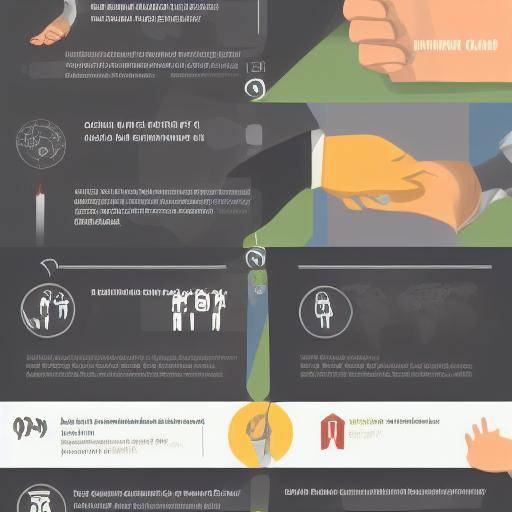
In the current business world, access to appropriate financing options is essential for the success of any entrepreneurship. Entrepreneurs face the challenge of assessing the various available financing alternatives and making informed decisions that boost the growth of their businesses. In this article, we will explore the importance of knowing the financing options available to entrepreneurs, analyzing different alternatives, highlighting the evaluation needed to make successful financial decisions, and offering practical advice to address this crucial process.
Introduction
The world of entrepreneurship is characterized by its dynamism and the constant need for financial resources for the development and growth of new projects. In this context, the ability of entrepreneurs to identify and evaluate available financing options is essential. From traditional financing through bank loans to more innovative options such as venture capital or crowdfunding, the diversity of alternatives can be overwhelming. However, understanding these in-depth options is crucial for optimizing the financial structure of a business and ensuring its long-term viability.
In this article, we will address the importance of knowing the available financing alternatives, comprehensive evaluation of these options and informed decision-making. We will explore the impact that these decisions can have on the development and success of an enterprise, providing valuable information for those seeking financial resources for their projects.
History and Background
To understand the importance of knowing the available financing options, it is essential to consider the historical background that has shaped the current picture. Over time, access to finance has evolved from traditional models to more innovative forms of investment and financial support.
Origins of Business Financing
The beginnings of business finance go back to the first forms of trade and barter, where entrepreneurs exchanged goods and services to obtain the resources necessary for their business activities. With the advent of money and the creation of more complex financial systems, the first lending and credit institutions emerged. These institutions laid the foundation for the further development of the financial system and the emergence of new forms of financing.
The Capital Investment Revolution
As the world economy expanded, the notion of capital investment emerged, which marked a milestone in business finance. Investors started supporting business projects in exchange for profit-sharing, which opened up new avenues of financing for entrepreneurs and growing companies. This revolution led to the emergence of venture capital and private financing as viable alternatives to traditional financing.
The Era of Financial Innovation
In more recent times, financial innovation has led to new forms of financing, such as crowdfunding and impact investments. These modalities offer entrepreneurs the opportunity to access financing through digital platforms and networks of investors, revolutionizing how resources are obtained for business projects.
Recent developments
In the current digital era, technology has played a key role in the evolution of business finance. Partner-to-peer loan platforms, blockchain and asset tokenization are just a few examples of how technology is transforming how entrepreneurs can access funding. These advances have significantly expanded available alternatives, providing entrepreneurs with more flexible and aligned financing opportunities with the needs of their projects.
Analysis in Deep
The evaluation of available financing options is a complex process that requires a comprehensive analysis of each alternative. From financial considerations to strategic and operational factors, the evaluation of financing options is essential to making informed decisions that will impact the future of an enterprise.
Benefits and Challenges
Each funding option presents a unique combination of benefits and challenges that should be carefully considered. Traditional financing, such as bank loans, can offer competitive interest rates and flexible deadlines, but often requires guarantees and may have strict credit requirements. On the other hand, the venture capital provides access to capital and resources, as well as to the experience and networks of investors, but involves the dilution of ownership and the making of shared decisions. In the case of crowdfunding, it highlights the ability to involve the community in the project, but requires a solid marketing and communication strategy, in addition to meeting the expectations of investors.
Trends and Statistics
Analyzing trends and statistics related to different financing options provides a valuable insight into the current state of the financial landscape for entrepreneurs. According to recent data, collective financing has experienced significant growth, with an increase in the diversity of financing models and increased participation of individual investors. On the other hand, venture capital remains a crucial source of financing for growth-stage companies, with investments covering a wide range of industries and regions. These trends offer insights on how the business financing landscape is being transformed and provide relevant information for decision-making.
Perspectives and Views
Consulting the perspectives and opinions of experts in the field of corporate financing provides a broader view of the implications and opportunities associated with the different alternatives. The experts emphasize the importance of aligning the financing strategy with the long-term objectives of an enterprise, as well as the need to fully understand the terms and conditions of each type of financing. Some experts also point to the trend towards hybrid financing approaches, which combine different sources of capital to maximize benefits and minimize risks. These perspectives offer valuable recommendations for entrepreneurs seeking the best financial approach to their projects.
Comprehensive review
A comprehensive review of available funding options involves exploring its practical application through case studies and best practices identified by experts in the field. It is a matter of analysing how different companies have successfully used various financing alternatives to boost their growth and achieve long-term success.
Practices and Case Studies
Examples of practical applications of available financing options provide a more detailed understanding of how these alternatives can be effectively exploited by entrepreneurs. Case studies that highlight successful financial strategies, such as the combination of traditional financing with venture capital investments to expand international operations or the use of crowdfunding to develop new innovative products, offer valuable lessons and examples to follow. These examples demonstrate how deep understanding of financing options can be a determining factor for the growth and sustainability of an enterprise.
Opinions of Experts and Innovative Ideas
Expert opinions and innovative ideas in the field of corporate financing drive analysis on how companies can optimize their financial strategy. Experts highlight the importance of flexibility and adaptive capacity in choosing financing options, as well as the need to consider the long-term impact of these decisions on business development. In addition, innovative ideas are explored, such as the creation of collaborative financing ecosystems that connect entrepreneurs and funding sources through digital platforms, opening new opportunities to access resources in a constantly evolving business environment.
Comparative analysis
The comparative analysis of financing options, the evaluation of these alternatives and decision-making becomes essential for entrepreneurs seeking the best financial solution for their projects. This analysis involves comparing and contrasting the different alternatives in order to identify their similarities, differences and possible synergies, providing a comprehensive view on how each alternative fits the specific needs of an enterprise.
Similarities and Variances
By comparing financing alternatives, the fundamental similarities and differences that influence financial decision-making are identified. While all options seek to provide financial resources, they differ in terms of associated requirements, structure, risks and benefits. This comparison allows entrepreneurs to understand in depth the implications of each alternative and make informed decisions.
Powerful Synergies and Complementarities
In exploring the potential synergies and complementarities between different financing options, new opportunities are opened to optimize the financial strategy of an enterprise. For example, combining traditional financing with venture capital investments can provide a balanced financial structure that strengthens a company's position for sustainable growth. Similarly, integrating crowdfunding as part of a broader financing strategy can boost community engagement and create a greater commitment to the brand. These explorations reveal how the strategic combination of different sources of financing can enhance business development.
Examples and Scenarios
Through detailed examples and practical scenarios, it is illustrated how different enterprises have applied comparative financing strategies to achieve successful results. For example, the comparison of financing decisions between two companies in similar stages of growth, one that opted for traditional financing and another that partnered with venture capital investors, allows us to understand how these decisions can affect the development and future projection of each company. These examples offer valuable lessons on how to effectively evaluate and compare funding options.
Practical Tips and Recommendations
Providing practical advice and recommendations allows entrepreneurs to face the process of evaluation and financial decision-making with greater clarity and confidence. These tips are based on best practices identified by successful experts and entrepreneurs, providing guidance on how to navigate the complex business financing landscape.
Strategies for Evaluation
Providing practical strategies for evaluating financing options helps entrepreneurs to structure a robust financial decision-making process. These strategies range from comprehensive financial feasibility analysis to risk and benefit assessment, through consideration of short- and long-term impacts. In addition, innovative approaches, such as the use of analytical tools and simulation models, can provide a more accurate view of the impact of financial decisions.
Key considerations
To present key considerations that need to be taken into account in evaluating financing options provides a clear guide for entrepreneurs. These considerations include financial factors, such as total financing costs and capital structure, as well as strategic considerations, such as alignment with long-term growth and sustainability goals. By providing a strong framework of key considerations, entrepreneurs can address the evaluation of financing options more comprehensively and effectively.
Tools and Resources
Providing information on tools and resources available to facilitate the financial assessment and decision-making process is crucial to supporting entrepreneurs. This may include financial analysis tools, step-by-step guides for risk assessment and benefits, as well as reliable sources of information to understand in depth the different financing alternatives. These resources provide practical and concrete support for entrepreneurs seeking to make informed financial decisions.
Industry Perspectives and Expert Reviews
Gathering industry perspectives and expert opinions in the field of business finance provides a vision of current and future trends, as well as recommendations to address the challenges presented in the financial field.
Implications for the Future
Analyzing the implications for the future of corporate financing allows entrepreneurs to anticipate changes and trends that could impact on the financing options available. Experts' perspectives highlight the importance of financial innovation and the increasingly relevant role of technology in the evolution of business financing. Emerging trends are highlighted, such as the use of blockchain in project financing and the development of more collaborative and decentralized financial models. These implications provide a strategic vision of how the business financing landscape could be transformed into the near future.
Interviews and Opinions of Specialists
Interviews with recognized specialists in the field of corporate financing offer a privileged view of the opportunities and challenges facing entrepreneurs in seeking funding for their projects. The views of these specialists address crucial aspects, such as the most effective financing strategies in the current economic environment, as well as recommendations for mitigating risks and maximizing opportunities in the financial assessment and decision-making process. These interviews provide valuable information and practical guidance for entrepreneurs in their quest for funding.
Cases and Applications in Real Life
Practical cases and applications in real life offer a concrete perspective on how financial decisions impact business reality. These real experiences provide tangible examples and lessons learned that can guide entrepreneurs in informed financial decision-making.
Results and Lessons Learned
Analyzing the results obtained from real business financing cases provides valuable insights on the effectiveness and implications of financial decisions. Cases that demonstrate how the choice of different financing alternatives has influenced the growth, profitability and stability of different enterprises are explored. In addition, key lessons are drawn that highlight successful approaches and errors to avoid when evaluating and selecting funding options.
Diversity of Industries and Contexts
Reviewing the diversity of industries and contexts in which different financing options have been applied expands understanding of the relevance and effectiveness of these alternatives. There are practical cases of companies in various sectors, from technological startups to social enterprises, to illustrate how financing options can adapt to specific needs and particular challenges. These examples offer a complete overview of the applicability and expected results of different financing alternatives in diverse contexts.
Future Trends and Predictions
Exploring future trends and making predictions based on current data and expert opinions provides a vision on the path that business financing could follow, as well as the challenges and opportunities that might arise in the future.
Emerging trends
Identifying and analyzing emerging trends in the area of corporate financing allows entrepreneurs to be aware of the opportunities and risks that could impact their financial decisions. Trends such as the rise in funding based on tokens, the inclusion of sustainability criteria and social responsibility in financing decisions, and the evolution of collaborative funding models are discussed. These trends offer a vision of how the business financing landscape is evolving and provide indications about alternatives that could be more relevant in the future.
Funded predictions
Performing well-founded predictions about the future of business finance, based on current data and expert opinions, allows entrepreneurs to anticipate scenarios and prepare themselves to address changes that may arise in the financial environment. The predictions include aspects such as the evolution of financial regulation, the influence of technology on the structure of business finance and the adaptation of financing models to the changing needs of entrepreneurs. These predictions offer a strategic guide to navigate a changing financial environment.
Conclusion
In conclusion, the importance of knowing the financing options available to entrepreneurs lies in the ability to make informed financial decisions that promote the growth and sustainability of business projects. From a historical understanding to the analysis of current and future trends, this article has explored the relevance of evaluating and comparing financing alternatives, highlighting the need to make informed decisions.
FAQs
Why is it important for an entrepreneur to know the financing options available?
It is crucial for an entrepreneur to know the financing options to ensure the viability and growth of your business. The choice of adequate financing can make the difference in the development of an enterprise.
What financing alternatives exist for entrepreneurs?
Funding alternatives include traditional loans, venture capital, crowdfunding, angel investors, grants and collective financing, among other options.
How can I evaluate the financing options available for my business?
It is important to conduct a thorough analysis of financing options, considering financial, strategic and operational factors. It is also recommended to consult field experts for additional guidance.
What are the current trends in business financing?
Current trends include crowdfunding growth, the adoption of innovative financial technologies and the convergence of hybrid financing approaches that combine various sources of capital.
How can I prepare for future trends in business finance?
In order to prepare for future trends, it is important to keep abreast of progress in the financial field, to participate in networks and communities related to entrepreneurship and to seek expert advice on financing.
What are some key recommendations for making informed financial decisions?
Some key recommendations include conducting detailed feasibility analysis, considering the short- and long-term impact of financial decisions, and taking advantage of tools and resources available for the financial assessment.
References
- "Evolution of corporate financing: from traditional banking to crowdfunding" - Harvard Business Review
- "Emerging trends in startups financing" - The Economist
- "Future of Finance: Industry Trends and Predictions" - Forbes
With these considerations in mind, it is clear that the comprehensive understanding of the available financing options is fundamental to the success and sustainability of any emerging company. In assessing, comparing and making informed decisions regarding financial alternatives, entrepreneurs can enhance the long-term growth and viability of their business projects.






















































